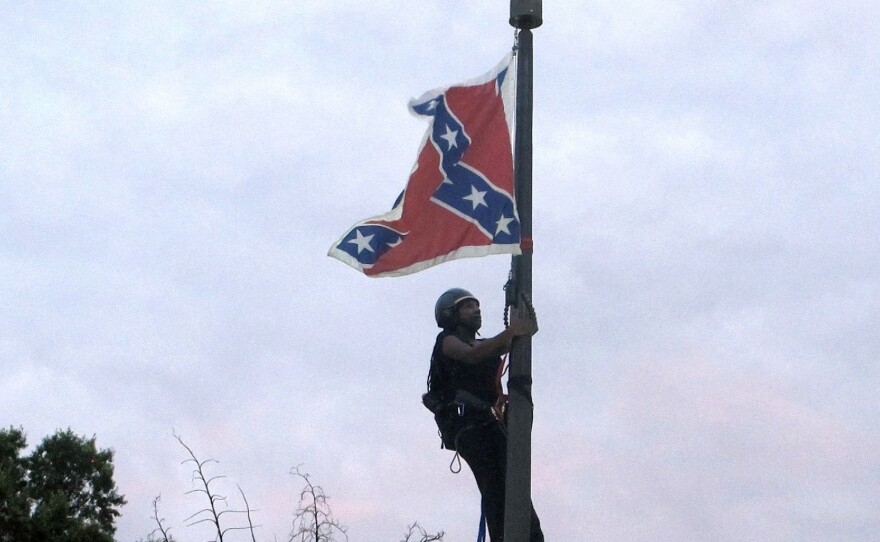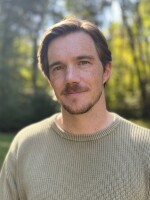Note: This program is a rebroadcast from January 9, 2017.
Activist Bree Newsome gained national attention in the summer of 2015 when she was arrested for scaling the flagpole at the statehouse in Columbia, South Carolina, and removing the Confederate flag. The act of civil disobedience took place in the wake of the killing of nine African-American people at Emanuel African Methodist Episcopal Church in Charleston, S.C.
While Newsome continues to engage in political activism in Charlotte, N.C., her roots are in the creative arts. As a kid growing up in Columbia, Maryland, Newsome started composing songs when she was seven years old. She eventually became a filmmaker and grappled with social issues through her work. Today she is a community organizer and works with social justice groups including IgniteNC and The Tribe.
INTERVIEW HIGHLIGHTS:
On fearing for her safety as she climbed the flagpole and removed the Confederate flag:
There were two officers guarding the bottom and a supervisor came over and told them to taze me. I’m attached to this metal pole with these metal clasps and that very well could have electrocuted me. At that point James [fellow activist] grabbed the pole and said, “If you electrocute her then you’ll electrocute me too.” Everybody else who was standing around videotaping at this point starting shouting and the police backed off. But that was what we wanted to show. This is attacking a potent symbol of racism with a new symbol that symbolizes a new way forward.
On what motivated her civil disobedience in South Carolina:
I had a lot of spiritual motivation behind what I was doing. I felt very deeply that what happened in Mother Emanuel on June 15th was a spiritually evil act. I felt that this action that we were taking really was nonviolence in its purest form. We thought through every aspect of it. There was a practical consideration of who could scale the pole and who could get arrested. That narrowed it down to about two people and I was the only black person who could do that. We really thought through the symbolism of this and the power of the image of a black woman scaling the pole and really symbolizing the struggle of the people over systematic racism that is represented by the Confederate flag.
On being arrested with a group of Moral Monday protesters during a sit-in at the General Assembly in North Carolina:
I was a politically conscious person, but a lot of my political awareness and focus had been on national politics. This was when I was plugging in and focusing more on what was happening in North Carolina. Part of what was such a shock to me was that I went out to the protest on Monday over voting rights. At that point, Republicans were putting it forward as this issue of voter ID and how students could no longer use their student ID to vote, which was a major issue. But what really put me at the point of saying, “I have to show up and do more” was seeing these young folks, especially people my age. Several of them had already been arrested protesting over this issue at the Capitol… I looked at all these folks who had already been making the sacrifice and to me it was this personal question of, “Who am I to not do something at this point while I am in a position where I could volunteer to go sit-in?”
On Newsome’s work as a filmmaker before she focused on activism and community organizing:
I’ve always had this sense of myself as an artist. This is something I have always done. For me the question has never been so much, “What am I going to do?” so much as, “How am I going to support myself doing what it is that I do?” I was always making films and telling stories and putting things together. From the time I was a child, I was making plays and putting them on at my school.
On Newsome’s love for Disney movies growing up and how that influenced her admiration for storytelling:
You can’t downplay the revival of the Disney musical in the ‘90s. That was my introduction to storytelling. I used to sit with my Disney videos and analyze why this story is so great. I would sit and watch The Lion King. First of all, when I saw it in theaters, I remember being 9 years old seeing that film and at the end of that opening sequence i thought, “Wow, that is what I want to do. I want to recreate for other people this feeling right now.” And I would sit and study how Disney made what they did, how they made it work. Then I got to college and that was some of the first coursework and I was like, “Wow, cool. I didn’t realize this was how you become a filmmaker.”
On growing up in the planned community of Columbia, Maryland and observing and experiencing different forms of racial inequality:
When I was in elementary school was when the school system introduced the Gifted and Talented program. That kind of program has different terms in other school systems, but it’s essentially for the students who they have identified as advanced and these students basically get placed on the track to college. From that point on, I was pretty much the only or one of two black children in my classes going forward. And my mother was an educator in the school system and she really had to fight to get me placed in the program. I think having that awareness of things as I was growing up definitely made an impact on how I viewed things, especially around education.
On her work as a community organizer in Charlotte and addressing recent racial tensions in the city:
In the most simple sense, the solution has to come from the grassroots level. In my opinion, a lot of the fundamental issues that we are facing right now have to deal with an imbalance of power between the haves and the have-nots.









